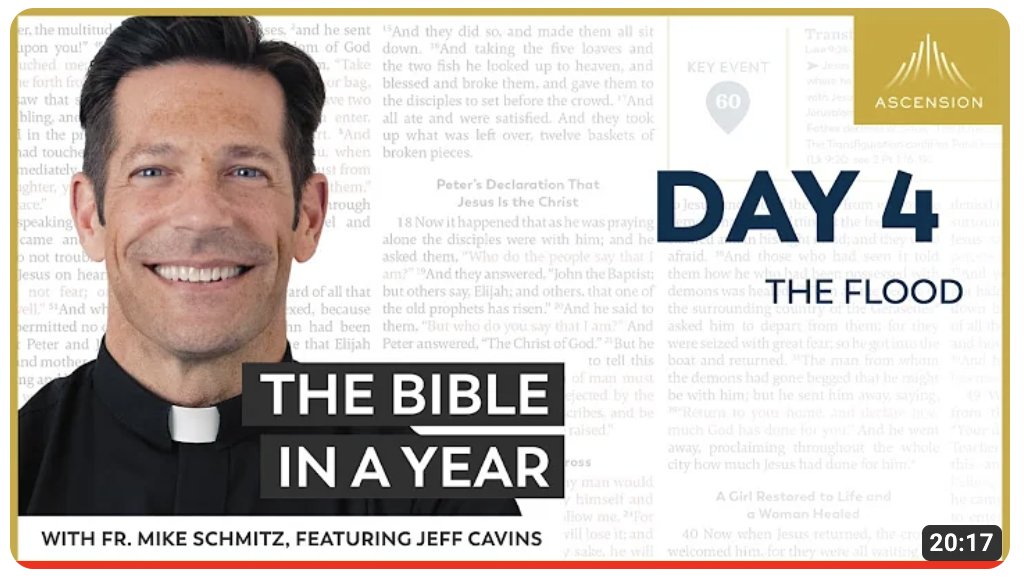Ascension Presents with Fr. Mike Schmitz- YouTube. Day 4, 2024

Genesis 7-9 and Psalm 1
Genesis 7 describes the directives to Noah to fill the ark with pairs of clean and unclean animals while God blotted out all other living things on the earth with a great flood— forty days and forty nights. The language is reminiscent of some of the water imagery in Genesis 1 and 2, so repetitions for oral language story recall are evident again.
Genesis 8 shows ‘The Great Reset’ where Noah and the animals and birds are set forth on the newly cleansed land to repopulate the earth. When Noah offers up all of the clean animals (the best of his stock) from the ark as burnt sacrifices on an altar to the Lord, God promises “I will never again curse the ground because of man, for the imagination of man’s heart is evil from his youth; neither will I ever again destroy every living creature as I have done. While the earth remains, seedtime and harvest, cold and heat, summer and winter, day and night, shall not cease.” The rainbow is a reference to an archer’s bow being set down by God and Him offering a more peaceful covenant with man again, albeit with some caveats.
Genesis 9 describes how God sets up a new covenant between Noah and his family. For the first time in the Bible, God speaks explicitly about the prohibition and murder of other humans. But He also gives permission for man to eat the animals and use them for man’s benefit, but without cruelty to these animals. This refers back to Adam having dominion over all the creatures of the Earth.
There is a reiteration of the brokenness of the human heart. These flaws are to be brought under obedience to the laws of God. It is important to see that with this obedience, gifts and subscribed freedoms within God’s law will also be available so that humans may thrive on Earth. Once again, sacrifice and death of animals seem to be required to ensure the thriving of humans.
Later in Genesis 9, Noah has a small incident with too much wine. One of his sons (Ham of Canaan- Canaan being the enemy of Israel) does not respect his father in his nakedness. Many scripture scholars read Ham seeing his father’s nakedness as Ham laying with his own Mother and thereby humiliating and rupturing the Father’s authority, rather than it being an act of lust. Ham’s sin is incest, and so the line of Canaan is cursed by God. The rupture of family, as with Cain killing Abel, shows how the evil in men’s hearts will lead to very bad things.
In contrast, two of Noah’s sons, Japheth and Shem, respect their father and make sure not to look at their father with pity or shame, given what Ham did to Noah and Noah’s wife. Instead, the two brothers cover their father’s nakedness, and this repeats the way God helped to cover Adam and Eve with garments of skin. The other two brothers, in contrast, are respectful of their father, and so their family lines will continue to be blessed because they follow God’s law about rightful respect for their father and families. According to Fr. Schmitz, the notion of ruptured families due to the evil in the hearts of men will be repeated a lot in the bible
Psalm 1 reiterates the teaching imbued in the story of Noah and his nakedness. It shows that those who follow God’s moral law will prosper, but those who are wicked and break that law will perish. So, although God will not smite the whole world ever again, as he did with the flood, those who do not take part in the covenant with God and obey his moral laws will still be ripe for a harsh correction.
Through the story of Noah and the flood, it is interesting to keep in mind that God still keeps offering gifts to humans, provided they follow his laws based on what we would see, even today, as good morals.
Rebekah Martin
Citations:
The Bible in a Year & More: Fr. Mike & Jeff Cavins. (2021d, June 13). Day 4: The Flood — The Bible in a Year (with Fr. Mike Schmitz) [Video]. YouTube. https://www.youtube.com/watch?v=k4ksCrLNO2U

Leave a Comment